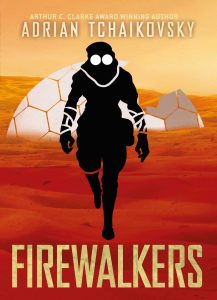FIREWALKERS by Adrian Tchaikovsky (Book Review)
 Sometime around the end of 2017 or beginning of 2018, I saw a call for short stories for an anthology titled If This Goes On, edited by Cat Rambo. I remember thinking I would try and write something for it – the call was for short stories that envisioned what the future might be like if we carry on along our current trajectory in relation to issues such as climate change, nationalism, immigration, world aid etc. I bring it up here because Firewalkers could have been written in response to that call, although in novel form rather than a short story.
Sometime around the end of 2017 or beginning of 2018, I saw a call for short stories for an anthology titled If This Goes On, edited by Cat Rambo. I remember thinking I would try and write something for it – the call was for short stories that envisioned what the future might be like if we carry on along our current trajectory in relation to issues such as climate change, nationalism, immigration, world aid etc. I bring it up here because Firewalkers could have been written in response to that call, although in novel form rather than a short story.
Firewalkers is a not-too-distant-future SF, set in a world where climate collapse has happened, and the world is burning. The entire equator is close to uninhabitable, a brutal desert that is slowly spreading.
Mao, our main character, is a teenage boy who works as a firewalker – someone who goes out into the desert to maintain the solar panels and water supply equipment that allows people to live in the Ankara (a town set up around a space port anchor). There’s a very clearly divided class system in the book. The rich and upper classes are leaving the planet to live on a space port above the earth. They pass through town only to stay at the posh hotel before ascending the elevator to space and a life of luxury, free from the shortages and dangers of earth. There’s a middle class who run things that are important to the rich – making sure the hotel has everything it needs for example – and many of them are hopeful of a new life above, if only they perform well enough. Below them, you have the poor, the actual workers who are providing the skills necessary to keep everything going. These people live in hovels, whole families to a room or two, often eating less than desirable food and always worrying about skin cancer, which takes many of them in what should be the prime of life.
Needless to say, Mao and his fellow firewalkers are from the latter group. Children with the weight of feeding a family, the only ones foolish enough and young enough to possibly get away with spending so much time in the desert under the relentless sun. When there’s a discrepancy in the power coming into the hotel from the solar fields out in the desert, it is Mao and his team (Lupe and Hotep) who are sent to investigate and get the power back on.
Increasingly strange encounters lead them further into the desert, where they uncover a threat to the status quo. A threat that will stop them taking a warning back if it possibly can.
I’m always impressed with the way that Adrian Tchaikovsky can turn his hand to any style of writing, any theme, and still come up with such wonderfully detailed stories. As can be expected, there are some bugs that are important to the storyline too.
There were parts of this book that I found quite stressful to read, not just because of the plot, but also because the world it is set in is so clearly a possible future of where we are now.
